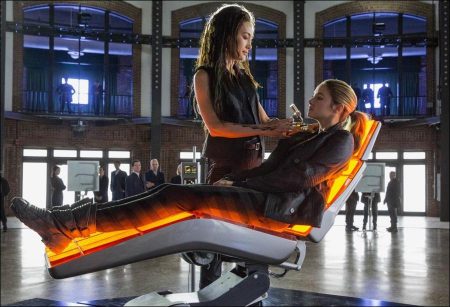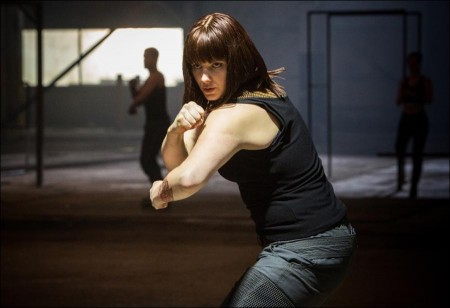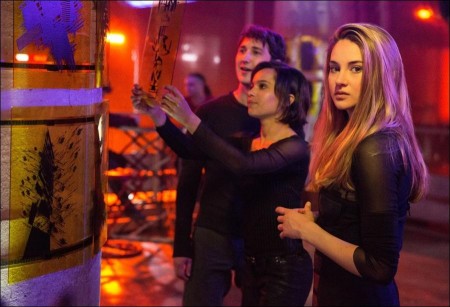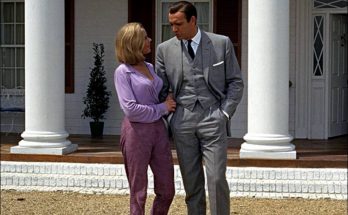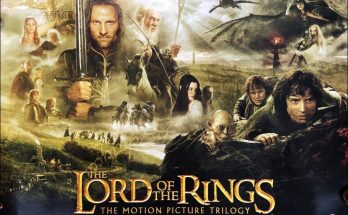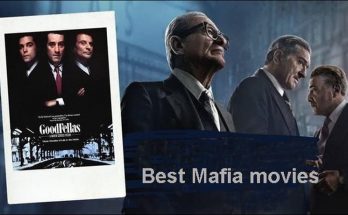Divergent is a thrilling action-adventure film set in a world where people are divided into distinct factions based on human virtues. Tris Prior (Shailene Woodley) is warned she is Divergent and will never fit into any one group. When she discovers a conspiracy by a faction leader (Kate Winslet) to destroy all Divergents, Tris must learn to trust in the mysterious Four (Theo James) and together they must find out what makes being Divergent so dangerous before it’s too late. Based on the best-selling novel by Veronica Roth.
The extremely popular young adult novel Divergent was written by first time author Veronica Roth and has topped the New York Times Bestsellers list since being published in May of 2011 by Katherine Tegen Books/HarperCollins Publishers. Divergent was named to NPR and Barnes & Nobles’ “Best Books of 2011,” and voted by readers of Goodreads as “Favorite Book of the Year.” The book was written by Roth while she was earning her undergraduate degree at Northwestern University. The studio acquired the film rights to the novel in early 2011 several months before Divergent was published.
Filmed on location in Chicago, the futuristic action adventure Divergent is directed by Neil Burger, from a screenplay by Evan Daugherty and Vanessa Taylor, based on the novel by Veronica Roth. Douglas Wick and Lucy Fisher produce the project via their Red Wagon Entertainment banner, along with Pouya Shahbazian. John J. Kelly and Rachel Shane serve as executive producers. Rothe also serves as co-producer.
The highly anticipated feature film adaptation of Divergent stars Golden Globe® nominated Shailene Woodley, Theo James, Ashley Judd, Jai Courtney, Ray Stevenson, ZosKravitz, Miles Teller, Tony Goldwyn, Ansel Elgort, Maggie Q, Mekhi Phifer, Ben Lloyd-Hughes, Christian Madsen, Amy Newbold, and Academy Award® winner Kate Winslet.
Divergent Ziplines: From Page to Screen
In 2006 during her freshman year in college, author Veronica Roth first came up the seeds of an idea that would grow into the action packed book Divergent. “I had this inkling about a subculture of people who wanted to eradicate fear in normal individuals, to create people without phobias,” explains Roth. “I didn’t actually write it until four years after that, and the first draft took six months. Then everything happened really quickly after that.”
Katherine Tegan Books/HarperCollins bought the manuscript – featuring a society divided into five factions set in a futuristic Chicago – in March 2010 and the novel was on bookshelves the following spring. “The editors likened it to The Hunger Games meets The Matrix and the ball started rolling very quickly,” remembers producer Pouya Shahbazian, who is head of the film division at the author’s literary agency. “There was a lot of excitement from day one with Divergent. Twitter was abuzz. The New York Times Bestseller list recognized it right away. It hit number six the first week.”
Several months before the book was published in May 2011, Summit Entertainment closed a deal in February to acquire film rights, with Red Wagon toppers Douglas Wick and Lucy Fisher attached to shepherd the story to the big screen. Wick and Fisher are Oscar® winning producers with over 25 years experience creating diverse, complete worlds in acclaimed and diverse motion pictures such as Working Girl, Girl Interrupted, Memoirs of a Geisha, Stuart Little, and recently The Great Gatsby, whose movies have combined box office over $2 billion.
“We’ve made a lot of movies from books, and as a producer you’re always looking for stories that you might want to tell,” comments Wick. “The first thing you bump into when you read Divergent is that you are experiencing a real storyteller in Veronica. From the very beginning, you are in this really well observed future world, with a character that you instantly connect to, who was about to make the great choice of her life. We got caught up right away and wanted to make the manuscript into a movie. It had everything we look for in a project.”
“Doug and Lucy are incredible people…they feel like your aunt and uncle immediately,” comments Roth. “They have a warm and welcoming quality. When I first met Doug, shortly after the rights sold, I wasn’t sure what to expect. He was so nice and really concerned about me as a human being, which went a long way in making me feel more comfortable with handing over my work to be interpreted by someone else. If he cares that much about me, then he’ll probably care that much about the book.
Plus, Doug and Lucy get involved only in projects that they feel very strongly about, because it’s not like they’re starved for work. They can pretty much do what they want. That also made me feel really good, that they got involved because they really loved it and they thought there was something that could be done with it that was really great. What more can you ask for as an author?”
“Veronica’s perspective has been very refreshing,” comments Shahbazian. “She loved the cast and crew. Although there has been certain changes along the way, Veronica has felt very comfortable because of the level of care and consideration that the filmmakers, the actors, the writers, have put into developing her world into an enhanced version of the book.”
Wick continues, “As we began to think about the development process, we saw more opportunities than problems. In terms of all the stuff that works well on the big screen and is cool to do in a movie: it had world creation, using great production and costume design. Then you throw in an epic story, and with a character you want to spend the movie with while they go into battle and test their mettle.
All that was there from the very beginning, so we were very aware of what a large tool kit was required from a director. He had to have the visual sensibility to create a coherent Chicago of the future, as well as be able to guide the performances in a well-observed, love story between two people. The director also had to have real instincts about storytelling because it’s a difficult story that includes an outer dystopian story, but also the inner personal story of going into the fear landscapes and learning about your interior life…a lot to juggle for any filmmaker.”
After being acquired by Lionsgate in January of 2012, Summit Entertainment signed helmer Neil Burger to direct the project several months later. “A lot of directors came in to meet with us,” adds Wick. “They brought visual samples of what they wanted to do, but just listening to Neil was so exciting for both Lucy and I, because he had the full tool kit that the project needed. He immediately had a visual way to make it coherent. He had a sense of the characters and how to make all the strands of the story be full at the same time.”
Burger had an early reader’s copy of Divergent on his desk while he was finishing his hit film Limitless. “The book sat in a pile of manuscripts, but at the top for a really long time. I was looking at it and it was looking back at me, but I never got to it. Then somebody from Summit called and said we have this script coming in and I want you take a look at it. It’s called Divergent . I have the book right here, so I read the book and I was in. I was hooked. I really liked the story.”
“The material allowed me to create a future world, which is always interesting for a filmmaker,” admits Burger. “But more than that, the story is about human nature and what this young woman is going through, which is universal. These issues of where do I belong? Who am I loyal to? Am I loyal to my group or my family or myself? What would I really go out on a limb for? I liked that those intense ideas were tightly tied into this epic adventure with great scope and emotion, and I had been looking to do a movie that was a big epic adventure.”
The project would require Burger to guide a large cast that includes up and coming young talent, critically-acclaimed veteran actors, and complete unknowns… top-lined by a 21 year-old actress who appears in every scene of the film. “We knew we’d have to have somebody who could direct a lot of actors, some who have never even been in a movie before. We have a cast of fifteen major parts, which is a lot of parts,” laughs Fisher. “We knew we wanted to have someone who could also attract one of the best actresses working. We had to have somebody that would be able to deliver performances. That’s a lot of bills to fill and Neil can do them all, and he can do them all very graciously and with kindness. He always has a point of view and brings out the best in everybody.”
“Having watched a lot of generals helm a set, Neil is world-class,” adds Wick. “He’s unbelievably steady. It’s such a hard job because you have fifty people coming at you every second, and you’re constantly making choices, yet he can get the best out of each of them. Neil does it all with calmness and clarity. He always has the freshness to fight for that extra quarter inch. He’s a world-class filmmaker.”
Fisher adds, “Neil turned out to be a little bit of a secret weapon. Anytime we were talking to an actor or a possible department head who wasn’t quite sure whether they were available or wanted to do the movie, we would always say, ‘Well why don’t you talk to Neil?’ We knew that as soon as they spoke to Neil, they would say yes. Everyone who had a discussion with Neil was really excited and wanted to do the movie.”
Divergent features a society that has willingly divided itself. “The premise is that human nature has failed, and if left to our own devices we will kill each other,” explains Fisher. “The best way to remedy that would be to psychologically get people to embrace the side of themselves that will then make the society, as a whole, cooperate with each other rather than fighting all your human attributes that might be in conflict. The course our story proves that that is not so easily accomplished.”
Burger states, “Divergent takes place in a future society where a person is permitted to be one thing, and one thing only. Tris is a young woman who is more than one thing, knows she is more than one thing, and wants to be more than one thing. She’s Divergent. It means she doesn’t fit in. In this particular society, if you’re different, you’re dangerous.”
The five factions of this future society are: Dauntless, Abnegation, Erudite, Amity, and Candor. “Dauntless are brave, courageous, adrenaline hounds, who like to test themselves. They are not only brave, but brave to the max,” explains Fisher. “Some might say they have a little bit of a predilection for self-destruction, some might say they are very disciplined. Of course, every faction has its negative flipside.”
Roth’s college studies inspired the Dauntless faction, and their fear landscape simulations. “I was an English major, but I took a lot of psychology classes and learned about exposure therapy,” comments Roth. “It’s a way of treating people with anxiety and phobia in which they are repeatedly exposed to the stimulus that frightens them, but in a safe environment. For example, someone who is afraid of heights will go into an elevator again and again until their brain rewires and they’re not as afraid of that thing anymore. The idea for the Dauntless faction came from these simulated environments in which a person can encounter their fear safely. The theory of the Dauntless is that over time, the fear will be gone, and you’ll create fearless people. But, as pointed out in the book, it is impossible. But, that’s the goal.”
The Dauntless and Abnegation worlds are featured heavily in the first installment of the saga. “Our story starts with the Abnegation faction, who are about selflessness,” states Fisher. “In some ways we had the biggest trouble understanding Abnegation as a contemporary society because why would anybody be like that? Choose to have less material things and to have less luxury. But when we went into the Abnegation house set for the first time, it was so cozy and so Zen and so peaceful, we actually could see why someone would want to not have the distractions of daily life and why Abnegation would be a very appealing faction.”
One of the main threats in the story comes from the Erudite faction. “Erudite are smart, intellectual, a little bit cold, a little bit sterile, and value knowledge above everything else,” continues Fisher. “Above emotion, they prize science and believe in a religion of facts. One of their big precepts is you can control human nature through science.”
Each group provides something essential to the whole society. “Amity is all about love and kindness,” smiles Fisher. “They are happy farmers, and they view the world through the lens of people are good, and spread the love.”
Fisher concludes, “The last faction is Candor, which values honesty. They do not filter their thoughts to please other people. Just say what you think, the truth always wills out. They think to accept the truth will be the best way to go about anything, as opposed to sugar coating it. So each faction has virtues and down sides.”
“Tris is born in the Abnegation faction,” explains Burger. “They are against vanity, or any showy clothing, or anything that puts the individual first. They’re always putting the other person first. But Tris feels like she doesn’t fit in there, because she’s not always thinking of the other person. She looks at the Dauntless students in her school, the warrior faction, and they’re fun. They’re fearless. They’re wild. They’re slightly out of control. They’re free, and that’s what Tris really craves…freedom. But it’s an agonizing choice for her, because she loves her family.”
Every citizen takes an aptitude test, which induces a mental simulation, to indicate for which faction he or she is best suited. However, at The Choosing Ceremony, each individual can exercise free will and pick any one of the five. “For Tris, staying in Abnegation would be the path of least resistance,” explains Shahbazian. “She could remain with her mother and father. To transfer factions is a big deal, especially choosing Dauntless, whose members jump off the train to get to her school. She has seen their bizarre haircuts, piercings, and tattoos… things she could not relate to on a personal level. So leaving Abnegation for Dauntless is as big a life transformation as you can have in this society.”
“What happens at the choosing ceremony usually follows what your aptitude test has already determined – what your personality is and where really you’re going live the rest of your life. But Tris’s aptitude test was inconclusive,” states Burger. “All it told her was that she was different, so she has to make a choice on her own. It’s a dangerous choice. Tris doesn’t fit into any of those factions. Even though she chooses Dauntless, she really is Divergent. But she has to hide that fact, even though she doesn’t yet understand exactly why. She doesn’t really belong anywhere. Her mind works in 100 different ways rather than the one way that it’s supposed to work, if you are in a faction. Being a Divergent poses a threat to the society, because the society is based on everybody conforming and staying in their box.”
Roth adds, “The choosing ceremony is the classic coming of age moment, but exaggerated. At some point in everybody’s life, you have to decide if you’re going to stick with the way you were raised entirely and fully commit to what your parents want you to do… or you have to decide to listen to your own internal compass. Discovering that you are an autonomous being who is different from your family who maybe is inclined to make choices that are not their choices, is one of the stepping stones to becoming an adult. Tris engages this idea in a super dramatic way. Either stay and be completely stifled, or leave and never see them again. So many people have connected to this because it’s something you can identify with even if you’re not living in dystopian Chicago.”
“One of the things that really drew us to this world was it was a utopian dystopia, it wasn’t just futile hopelessness,” comments Wick. “A lot of dystopian worlds are hopeless, but this was a place that had a dream. There was a sense that people had at least reached for a better way of life. They had higher aspirations that are now that in decline. The dream is juxtaposed with everything that is failing. We love stories about empowerment. From the very beginning you take a character, Tris, and you create unbelievable obstacles for her and you show her finding the inner resources to overcome them. That’s a story that works great on the big screen.”
“There’s a very wonderful moment after Tris chooses, where you can see the terror on her face of what she might be doing to her family and hoping that she’s making the right decision,” adds Fisher. “But as she walks towards Dauntless, who are applauding her choice, you can see her start to feel happy, yet still wistful. That’s a great metaphor.”
“Tris’ choice in defining her identity is similar to the choices that we all make in our lives, whether we make it at a given moment, or gradually,” comments Fisher. “To dramatize it, and more the idea that you’re making it very consciously and sometimes at the expense of your relationship with your family, is something that felt very resonant. What choice would you make? Who are you? You almost can’t read the book without thinking, which faction am I? Of course, everybody says they’re Divergent, but you can’t choose Divergent.”
The worst thing that can happen in this future society is belonging nowhere. “If you’re not in a faction, you’re factionless, which is like being ten times worse than homeless,” comments Burger. “You’re excluded from everything. If Tris doesn’t make it in Dauntless, she doesn’t just go home to her parents. The system can’t work if you can switch between different factions. If she’s cut from Dauntless at the end of training, she’s factionless. As she and the other initiates go through this training period, this boot camp, they are scored on everything they do. Tris finds herself at the bottom of the scoreboard, in the red, right from the beginning. She works hard and she gets better, but it’s frustrating and it is incredibly frightening. She knows the consequences.”
Burger adds, “Veronica really has her finger on something in this book. She was incredibly young when she wrote it, but she had some kind of laser beam in on the essential emotion of this young woman. But this is not just a young adult story. All the issues in it apply to anybody, whether they’re in their teens, twenties, thirties, or forties. Veronica really, really understands that and that’s what appealed to me about the book. It was about something much larger — these personal ideas about where do I belong and who am I? But also about these larger ideas about how do we all get along in society, and how does a society ever live in peace with itself.”
Divergent
Directed by: Neil Burger
Starring: Shailene Woodley, Theo James, Zoe Kravitz, Ansel Elgort, Maggie Q, Jai Courtney, Kate Winslet
Screenplay by: Evan Daugherty, Vanessa Taylor
Production Design by: Andy Nicholson
Cinematography by: Alwin H. Küchler
Film Editing by: Richard Francis-Bruce
Costume Design by: Carlo Poggioli
Set Decoration by: Anne Kuljian
Music by: Junkie XL
MPAA Rating: PG-13 for intense violence and action, thematic elements and some sensuality.
Studio: Summit Entertainment
Release Date: March 21, 2014
Related Link: View the Full Production Notes for Divergent
Views: 178
